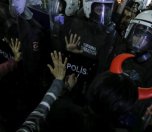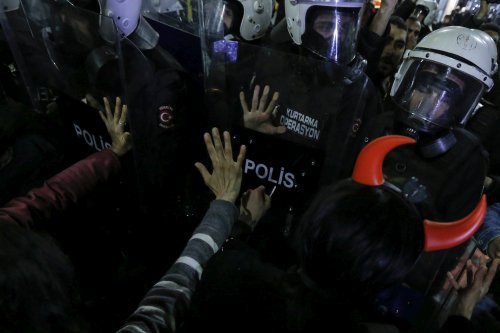*Women hold a banner that says, 'We are not family, we are women," in a demonstration in İstanbul.
"... we have been walking for centuries, we have been struggling to protect our fatherland, our nation, and those oppressed [peoples] whom we can reach, and to make the world a better place to live.
"... This movement carries in itself Sultan Abdulhamid's [Abdulhamid II] acumen, Mehmet the Conqueror's heroism, Osman Ghazi's prudence, Nureddin Zengin's courage, Sultan Alparslan's faith. This movement carries in itself the horizon, vision, imagination of Ghazi Mustafa Kemal. This movement carries in itself the life of Adnan Menderes... the great effort of Necmettin Erbakan... the efforts of our late President Turgut Özal.
"This movement has embraced the God's word, brought onto Mecca's steep mountains 14 centuries ago, and the Prophet gracefully sent to the universe as its guide. This movement has been nourished by those rish springs that extend from Ahmet Yesevi to Mevlana, from Hacı Bektaş-ı Veli to Hacı Bayram-I Veli, from Yunus Emre to Fuzuli, from Ahmedi Hani to Melaye Ciziri, from Nazım Hikmet to Necip Fazıl, from Mehmet Akif to Sezai Karakoç ("AK Parti Birinci Olağanüstü Büyük Kongresi" 2014.)"
Above quotation from Erdoğan's speech at the AKP's First Extraordinary Congress (August 27, 2014) - when his prime ministry was terminated and his presidency was officially started - is representative of the historicist claim. This claim has defined not only the AKP, but many of the rightist nationalist political parties in republican Turkey. Here it is distinctive in that it encompasses all the male representative figures, embraced by different religious and/or political stances in not only Ottoman-Turkish history, but also in pre-Ottoman - presumably - Islamic history of Turkey. It is more a holistic and syncretic culturalist claim to re-define a nation's present through a selective integration of politically and culturally symbolic persona.
A feminist lense allows one to observe the new institutionalization framed by such rhetorical constitution. It enables one to see the patterned exclusion of women – and/or nonheteronormative male gender identities – from the historical persona, and how it fits into the pattern of the AKP's gender policies throughout its rule, as well as the reference to mastership to define the current phase of its rule. A feminist lense also enables one to see the regime transformation not through a rhetoric of exceptionalism but through the connections and differences among different modes of patriarchy. It enables one to see the continuities in the gendered discrimination and gender-based inequalities as well as in the rights-based/feminist struggles for gender equality. In this respect, the reading above invites a reconsideration of the mode of patriarchy in the last phase of the AKP's rule.
Considering that the mode of patriarchy during the AKP's rule until 2013 was a transitory one (Coşar and Yeğenoğlu 2011), it is apt to note the emergence of a new mode that complies with the basics of the new regime. In Coşar and Yeğenoğlu's (2011) terms the transitory mode of patriarchy under the AKP's rule was a neoliberal-conservative one.
It was different from the Republican mode since it appealed to the Sunni-Muslim sentimentalities and conservative family values in addressing women's sociopolitical status. It was different from the liberal mode since it embraced the rhetoric of women's right to work with a view to their traditional familial roles, and not as individuals. The neoliberal flexibility priorities worked in tandem with this transitory mode of patriarchy. The labor market related measures that the AKP governments have taken so far were fit to its conservative agenda, juxtaposing the delimitation of the social universe with the glorification of the heterosexual family.
The anti-rights social and political measures were less acclaimed at the party level until 2014. It was mostly the head of the party, Erdoğan who would voice anti-feminist and anti-women's rights priorities with rather provocative rhetoric – as it happened in his likening of abortion to murder (2012) in his open statement that he does not believe in gender equality. Such provocative rhetoric was accompanied by the prominent party members' anti-feminist statements, which were spelled out in seemingly arbitrary fashion.
A feminist perspective helps one to relate this pattern to the institutional changes – both nominal and policy-oriented. Thus, it brings in the symbolic importance of nominal changes from the AKSB to ASPB and most recently (2018) to the Ministry of Family, Work and Social Services (Aile, Çalışma ve Sosyal Hizmetler Bakanlığı, AÇSHB) in understanding anti-feminist, anti-women and anti-equality policy preferences that define the new regime.
I would argue that by 2014 when Erdoğan was elected as the President, and when he was yet to be enabled to stand also as the head of the party, vociferous statements against topics of interest in women's rights-based agenda were gradually turned into a matter of party politics. A parallel development has been in place at the level of newly emerging civil societal formations, sharing the conservative priorities.
This is not to say that Erdoğan gave up in talking antifeminist and anti-equality. On the contrary, it is possible to underline the consistent overturning of the feminist equality claims for anti-equality stance ("Erdoğan Cinsiyet Eşitliğinin Fıtratını Anlattı" 2018): [16]
"You cannot put the weak and the strong into the same race. Some insist on 'equal[ity], but shall we run 100 meters the same, women and men? ... Let's say we are equal; let men and ladies run 100 meters. Can this be just? No ... What should be done? Woman runs against woman; man runs against man. ... Because this is what is in line with creation, nature [fıtrat]. This is why there is no such practice anywhere in the world. You cannot keep the oppressor and oppressed in the same circle."
Erdoğan's anti-feminist performance turned out to be mostly a repetition of what he had already said, this time in such occasions as his opening speeches to the party's women's branches' meetings, opening speeches to March 8 events organized by GONGOs and/or the government. His claims were backed up by a fragmented pro-government civil societal networking process. Starting in 2014, the identification of the individual with the male person, the boiling down of the social into the familial, and the Sunni-Muslimization of women's rights claims especially in the social realm turned out to be decisive features in Turkey's sociopolitical space. Besides, by then and afterwards, differing prominent members of the party have voiced the party's patriarchal contentions on a regular basis.
Exemplary in this respect is Ahmet Davutoğlu's family projects during his prime ministry (2014-2016), almost concomitantly with the ASPB's Family Project (2013). A survey of the Family Bulletins published by the Ministry between 2013 – 2015 also attests to the propagation of heterosexual Sunni-Muslim families with ample space reserved for the cooperation between the Ministry and DİB. In parallel, a Parliamentary Commission to Survey/Inquire into the Factors that Negatively Affect the Unity of the Family and the Divorce Incidents and to Depict the Necessary Measures for strengthening the Institution of Family was decided to be formed in December 2015. The Commission prepared and published its report in May 2016.
The report can be considered as the most comprehensive statement of the AKP's version of backlash for women's rights. It is more the religious patriarchy than gender equality that is at stake in the report. The report can be read as a statement for preserving the heterosexual family with reference to Sunni Islamic Turkish culture. As also underlined in two of the three statements of opposition, the way the commission run the process, the civil societal actors invited to participate in the process, and those that are explicitly excluded are also telling of the new mode of patriarchy.
Prominent feminist experts and/or organizations involved in the struggle against violence against women for decades were excluded from the discussions on commission report. Instead, initiatives such as the Platform for Divorced People and Family, Association of Children Left without Fathers, Fathers without Children, and the Platform for Divorced Fathers were considered as partners.
Among others, the report contains proposals such as decreasing the restraining period to 15 days, enforcing negotiation and moderation before starting the divorce process, and bringing in five-year-long surveillance period for child abusers in case of "unproblematic" and "successful" marriage with the victim. It also implicates enabling to locate theologians in family counselling services ("Muhalefet Şerhi 1" 2016, 402; Elçik 2016.).
The report can overall be considered to fit into the typical policy formation process that can be defined in terms of "package politics" under the AKP governments, especially in policies concerning social rights. The usual routine runs as follows: The government checks the public opinion through commission reports. At this stage, opposition parties in the parliament and related civil societal actors are included in the debate. The second stage evolves through the proliferation of the proposals contained in the package. The third stage concerns the legalization of the policies on an individual basis in different – and mostly – omnibus bills. This, I would locate into the scope of the neoliberal order of things – thus, marking the continuity of the neoliberal effect into the latest phase of regime transition in Turkey.
In this last stage of the religion-based conservative attempts to monopolize gender equality-related laws, the government seems to step back to leave the room to either GONGOs and/or short-term civil-societal organizations. Thus, we see first KADEM as a representative of the AKP's conservative practice. Then comes initiatives such as the Platform for Divorced People and Family and/or Family Platform to volunteer against the already enacted legal amendments for gender equality.
In the same process, a number of women's rights/feminist organization, which have long been involved in activist work in various policy spheres, are banned and/or closed, while well-known feminist activists and experts encounter criminal restrictions. Ayata and Candaş (2019, 180) aptly read this development as a matter of "de-institutionalization" that marks the reactive phase, following the "proactive" phase when women's movements in Turkey has had relative leverage in effecting legislation concerning gender equality (Ibid., 183). Familialism with immediate connection to religious moral grounds is an important aspect of these conservative attempts.
This new mode of patriarchy is distinct in that it is not only advocated by the AKP cadres and/or by Islamist political actors. Its carriers comprise those AKP supporters and electorate who represent a wide range of socio-cultural profiles, especially among women actors. One can relate women's involvement in the backlash, and the mode of patriarchy it defines, to Şahin's dismissal of feminism (see p. 6), and the parallel aversion to feminist stance among women politicians who came to occupy the same position. In fact, this anti-feminist positioning can be considered as a persistent theme in the discourse adopted and reproduced by the ministers of the ASPB/AÇSHB that has evolved from a relatively less conservative familialistic identity to a directly religious moralistic one (Ayata and Candaş 2019, 183).
Exemplary is Ayşenur İslam's attempts – ASPB Minister Family and Social Policies in the 62nd AKP government (2013- 2015) – to withdraw Turkey's signature from the İstanbul Convention. Her successor in the 65th AKP government – the last of parliamentary democratic regime in Turkey – Fatma Betül Sayan Kaya, continued with the pervasive familial prioritization, where women outside the heterosexual family attachments are not taken into consideration in policy-making.
As the regime transformation unfolded, this moralistic tendency is further reinforced within the frame of religio-nationalistic discourse. Thus, Kaya's swinging between the statements for having 50% parliamentary representation for women, ensuring improvement in women's employment on the one hand ("Yakın Bir Gelecekte Kadının Temsil Oranı Yüzde 50 Olacak" 2016) and reservations for "the narrow and insufficient version of equality" (http://kadem.org.tr/ii-uluslararasi-kadin-ve-adalet-zirvesibasladi/) on the other hand hints at the religious conservative attempts to hijack women's rights claims:
"... [Our] most important goal is that woman gains the reputation that fits to her truth. The mentality that considers woman as independent from knowledge, production, family and children has prepared the grounds for an irreparable social downfall. In our efforts to bring woman to the level that she deserves we cannot ignore her role in the family. This is one of the main delusions of the modern world."
The above account on the unfolding of the anti-feminist and anti-rights-based claims through the institutional settings that are presented as the venues for women's rights is a micro representation of the new mode of politics in the emerging regime in Turkey. This new regime works through personified encounters with the parties to the policy spheres that are being remolded by the AKP governments. Thus, it is more the women cabinet members who have assumed ministerial positions related to women's rights who come to the fore rather than the continuities and changes in the mode(s) of patriarchy. In this respect, feminist perspective leads one to read the new mode of patriarchy in Turkey through personalism, religion-based conservatism and fascistic style of ruling, which also comprise the decisive features of the regime change that the country has been experiencing.
All in all, feminist perspective enables one to see the nuance in the religious basis of this new mode of patriarchy. It considers women's active role in the construction of the new mode not solely as individuals with claims to motherhood-as-performance but also as actors in institutional politics, and not necessarily as performing motherhood but as women counterposing gender justice to feminist demands for gender equality. Thus, comes the personalistic, religious patriarchy.
This mode of patriarchy is different from the Islamist, liberal, and republican modes in that it merges the two versions of patriarchy in Sylvia Walby's (1990; 1989) classification – public and private patriarchy – into personalistic politics. The consolidation of familialistic frame in a variety of policy spheres extending from governmental setup to social policies, and (national) security evinces this merge. So do the concurrent attempts on the part of the AKP governments to monopolize the say in the making of the family laws.
As Yakın Ertürk (2019) succinctly puts, the familial sphere works as the site of contestation between different modes of patriarchy, hence as the site of feminist struggle against not only private but also public patriarchy. The personalistic, religious mode of patriarchy works through the reframing of the familial relations, and as such, it is directly related to what Ertürk (2019, 16 and 22) defines as "...patriarchy adorned with Islamism..." relying on the "backlash and political authoritarianism, which is systematically co-opting and marginalizing feminist agenda and activism..."
Conclusion
In this article, I propose a feminist reading of the regime change in Turkey. In so doing I do not subscribe to the categorizations that surrender to the patchwork politics of Turkey's neoliberal times, thus limit a process of regime transformation of almost four decades to a snapshot of electoral terms under the AKP's terms in government. Neither do I subscribe to an analysis built on exceptionalist reading of the AKP's rule, especially in the aftermath of 2016 coup d'état attempt. The analysis is not built on the categorizations based on these lines of readings, because not only they by-pass the routinization of fascistic track through which the regime change has unfolded in Turkey but also none of them pass the gendered litmus test.
A feminist look to the related state of affairs tempts one to conclude with the state forming an immediate and intimate connection with the women – inviting women to heterosexual family via marriage for claiming rights. This perspective also emphasizes the manipulation of manly – and not necessarily all male – civil societal initiatives to counter the well-built women's rights/feminist advocacy. Lastly, the ongoing rights violations by the hand of the government since 2013 parallel the reconfiguration of the civil societal sphere by women's GONGOs thus, the pervasion of the social space by the institutional powerholders.
In its current state, the new regime hosts a personalistic/religious mode of patriarchy which calls for intimacy between citizens and governing units, in general, and women and the president's persona, in particular. This mode of patriarchy works through women's involvement into anti-women's rights, anti-gender equality and anti-feminist policy processes. It re-invents the vocabulary for women's rights turning rights into a matter of one's creational capacities, thus, reproducing the maleist argument for the impossibility of gender equality. It does so through women's agency and with reference to the achievements of the women's movements in post-1980 Turkey.
The major strategy of women's movements, especially starting in the latter half of the 1990s – the period when women's rights demands began to be recognized at the institutional level (Özkan- Kerestecioğlu 2004) – was manipulating the patchwork style of policy-making in the neoliberal order of things (Coşar and Özman 2009), lobbying for policy-specific rights-based claims rather than pursuing a holistic approach that would involve relying on struggles against exploitation and/or structural violence. The new mode of patriarchy originates from within the same setting that hosted the unfolding of patchwork style into package politics. The history of feminist struggle in Turkey hosts the dialectics countering this new mode of patriarchy, and thus, the personalistic rule that is being instituted. (SC/VK)
CLICK - Part 1: Regime Change in Turkey: Old Symbols into New Settings
CLICK - Part 2: The AKP's Gender Regime: Anti-Feminist Consistency
CLICK - Part 3 - Regime Change and the New Mode of Patriarchy in Turkey
About Simten CoşarProf. Dr. Simten Coşar graduated from the Department of Political Science and International Relations of Boğaziçi University in İstanbul. She completed her Master's and PhD studies at the Department of Political Science and Public Administration of Bilkent University in Ankara. Her major subjects of academic interest are political thought, political thought in Turkey, political parties in Turkey and women in political thought. Her articles have been published on a series academic journals including the Journal of Political Ideologies, Contemporary Politics, Feminist Review, Journal of Third World Studies, South European Society and Politics ve Monthly Review. She has retired from the Department of Radio, Television and Cinema of Hacettepe University Faculty of Communication. |
Footnotes:
[16] The quotation here is telling about the arbitrary logic that runs through the personified rhetoric in government. It is also telling about the inner contradictions of religio-conservative look at feminist demands for gender equality.
References:
Aile Bütünlüğünü Olumsuz Etkileyen Unsurlar ile Boşanma Olaylarının Araştırılması ve Aile Kurumunun Güçlendirilmesi İçin Alınması Gereken Önlemlerin Belirlenmesi Amacıyla Kurulan Meclis Araştırması Komisyonu Raporu. 2016. https://ailetoplum.aile.gov.tr/uploads/pages/aile-butunlugunuolumsuz-etkileyen-unsurlar-ile-bosanma-olaylarinin-arastirilmasi-ve-ailekurumunun-guclendirilmesi-icin-alinmasi-gereken-onlemlerin-belirlenmesiamaciyla-kurulan-meclis-arastirmasi-komisyonu-raporu/meclis-aras-tirmakomisyonu.pdf (Accessed: January 1, 2019).
"AK Parti Birinci Olağanüstü Büyük Kongresi." 2014. http://www.milliyet.com.tr/ak-parti-1-olaganustu-buyuk-kongresi-ankarayerelhaber-354314/ August 28.
Ayata, Gökçeçiçek and Candaş, Ayşen. 2019. "Turkey." In Feminist Advocacy, Family Law and Violence against Women: International Perspectives, edited by Mahnaz Afkhani, Yakın Ertürk and Ann Elizabeth Mayer, 178-197. London and New York: Routledge.
Coşar, Simten and Metin Yeğenoğlu. 2011. "New Grounds for Patriarchy in Turkey? Gender Policy in the Age of the AKP." South European Society and Politics, 16 no.4: 555-573.
"Erdoğan Cinsiyet Eşitliğinin Fıtratını Anlattı." 2018. http://www.diken.com.tr/erdogan-cinsiyet-esitliginin-fitratini-anlatti-kadinkadinla-erkek-erkekle-kosar/ November 23. (Accessed on December 2, 2018)
Ertürk, Yakın. 2019. "Feminist Advocacy for Family Law Reform." In Feminist Advocacy, Family Law and Violence against Women: International Perspectives, edited by Mahnaz Afkhani, Yakın Ertürk and Ann Elizabeth Mayer, 11-29. London and New York: Routledge.
"Muhalefet Şerhi 1." 2016. In Aile Bütünlüğünü Olumsuz Etkileyen Unsurlar ile Boşanma Olaylarının Araştırılması ve Aile Kurumunun Güçlendirilmesi İçin Alınması Gereken Önlemlerin Belirlenmesi Amacıyla Kurulan Meclis Araştırması Komisyonu Raporu, 398-408.
Özkan-Kerestecioğlu, İnci. 2004. "The Women's Movement in the 1990s: Demand for Equality and Democracy." In The Position of Women in Turkey and in the European Union: Achievements, Problems, Prospects, edited by Fatmagül Berktay, 75-98. İstanbul: KA-DER.
Walby, Sylvia. 1990. "From Private to Public Patriarchy: The Periodization of British History." Women's Studies International Forum, 13 nos.1-2:91-104.
Walby, Sylvia. 1989. "Theorizing Patriarchy." Sociology, 23 no.2: 213-234.
"Yakın Bir Gelecekte Kadının Temsil Oranı Yüzde 50 Olacak." 2016. https://www.sabah.com.tr/gundem/2016/12/05/yakin-bir-gelecekte-kadinintemsil-orani-yuzde-50-olacak December 05.
http://kadem.org.tr/ii-uluslararasi-kadin-ve-adalet-zirvesi-basladi/ (Accessed on December 17, 2018.)











